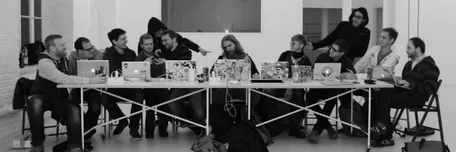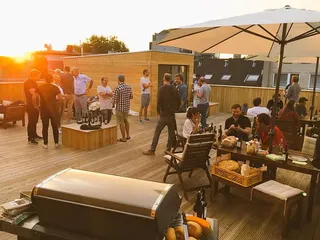More productive through less bullshit

Corporate growth kills individuality – or at least it tries to. We found, at least for us, an approach to combat the slow death of our company culture while growing from a living-room-like office with a few team members to a global player with over 80 employees and the founding of several start-ups.
When a company grows, the culture won't just come along. You have to make sure to guide it in the right direction.
Managing yourself
9elements always has been proud of its unique approach of working together. Since its establishment in 1999 the company has grown rapidly while still maintaining approachability and the very distinct surprise of clients: "We pictured your working environment vastly different."
Coming out of this phase, where a few dudes decided to work together the way they wanted to – with no pressure from above and no overmanagement bullshit - simply due to the lack of good alternatives, 9elements never really had a classic management structure. Sitting all together in a two room office, everyone knew about everything, so most tasks were done by whoever felt responsible for it.
But growing over the next few years, hiring more and more people, it became clear that this wouldn't work indefinitely. New people coming to the company didn't feel as in charge as the older crew members. There were no clear responsibilities set up for new employees to understand the work flow. We needed a solution, while still not disturbing the individual way of working and especially without hierarchies – the reason why 9elements was founded in the first place, to combat the old types of company structure.
Holocracy (or not?)
One of our team members then took it onto himself to learn more about holocracy and breaking up hierarchy system in companies. As we already didn't really had a traditional chain of command there wasn't that much to destroy rather than to build up this new type of 'management'.
The (simplified) basics of our approach to holocracy is the principle: Roles instead of Positions. Employees should get real responsibilities, not just tasks.
If you have to tell your employees how they have to do their job, either you or they're doing something wrong.
But it's still very important to give them valuable support! We don't just leave them up to their work until it's finished, we encourage them – if they want to – to discuss their actions with one another and to get the opinion of others.
Coming out of a very strict culture of strong criticism, most of us firstly had to learn how to give feedback. It's totally okay if something goes wrong – it happens to the best of us, but it's not okay to not learn from your mistakes and to repeat them.
More on holocracy: https://www.holacracy.org
The exhausting transition
Knowing about these new 'rules', it was apparent that this switch to this type of management won't be easy. While people have done tasks, because they felt responsible for it at that moment, now there's someone else whose role it is to do that exact same thing – sometimes not the way some crew members would like it to be done. We knew it'd take several months for everyone to get used to this.
Adjust the structures to the company, not the other way around.
But that's only a part of the holocracy model. We by far didn't incorporate every single detail of it into our company structure and only used the things which fit best to us. You could argue we don't really do holocracy, but some weird subversion of it – we'd say to that: "So what? It works."
Remote Work
One important thing, though – because someone else does it, and it works, doesn't mean it's for everyone. Here's an example:
Our spin-off company img.ly, who develops ready to use photo and video editing software development kits, has gone fully remote over the last few months. With several team members already working from different countries, it has been the next logical step for expanding their workforce and using the resources where they are needed.
But for 9elements itself, especially while working with clients and developing new products, this "remote first" approach wouldn't work at all – especially after experiencing the 'forced' remote period through the pandemic. We're deeply connected to our company culture inside our offices, the regular meetings with people which generated so many great ideas we wouldn't have found otherwise. Many companies have experienced the shift of regular 9 to 5 / 40 hour weeks inside the office to a more open approach with partial home office. While we've always allowed our crew to stay a day at home if needed, we still believe our strength as a company comes through our on site culture, where you're able to have light conversations or vastly deep discussions about interesting topics – often resulting in new ideas.

Other tools we used
Flexible working hours
As a technological agency with many developers we've always known that people have their own 'ideal' working hours, and we don't want to force them into a typical 9 to 5 week.
But, there's also a limit to this flexibility: If you work with a colleague on a project, who wants to be home with his children in the late afternoon, you shouldn't be working from 18 until 2 in the morning for yourself. We usually note: "When you work should be determined with common sense."
The same goes for illnesses. Sometimes you just need to lay down for a few hours, and you'll be better. Unlike the usual German tradition of consulting your doctor for every single hour of sick leave, we encourage and trust our crew members to determine by themselves, if they're too sick to work and leave it at that. Only if there are longer periods of downtime we follow the usual procedure of sick leave notices from the doctor.
Transparency
From the years, where everyone knew what was going on, because the whole team sat in one small office and couldn't not hear what others were talking about to today employing over 80 people, we always believed in transparency.
Decisions with common sense need information and transparency
From basic information about who is working on which project to the budgets these projects require is everything readily available for everyone. In quarterly meetings we discuss these topics as well as how much money we as a company have made, as well as how much we had to spend.
Especially in this pandemic, as we've also been hit by canceled projects and less earnings, we openly talked in meetings with the whole team about the current financial status of the company. In our eyes, everyone should know if there's something to worry about to be able to plan accordingly.
The same goes for the political position of 9elements. We want everyone to be able to openly discuss or give their concerns about questionable projects or customers. For example: As we've been working with crypto for quite a few years, we were curious about the next big thing everyone in the space spoke about - NFTs. But many of our employees presented their environmental concerns, as the sustainability of this tech is strongly argued.
There's one big exception for us in terms of transparency though: The salary. While transparency is important, we and many others before us had many long discussions, if it makes sense to blatantly tell everyone, what everyone else is earning (or even let them decide how much they earn)? Experience and psychology told us: probably no. 50 Percent of employees earn less than the average (obviously) and knowing you might be on the low end worsens the work ethic subconsciously.
Work-Life-Blending
Our goal is it to incorporate the work life into our lives. Being at work makes up such a huge part of everyone's daily life, that it should (ideally) be seen as something complementary. We don't want anyone to feel annoyed about getting into to work, we want our employees to enjoy their time in the office even after the official working hours are over. Our office is a place where many people would meet even if they wouldn't have to work that day.
If I accept that an employee works until late at night, even though he started early in the morning, I also have to accept him sitting on the rooftop of our offices drinking a beer at noon on another day.
This flexibility in work and free time has allowed us to work with many clients overseas and to adjust to their working hours, while still enabling our crew to get their proper amount of leisure and work-free time for themselves.
Enabling Parenthood
One topic which slowly creeped up on us over the last few years was the desire to have children and associated worries about the future for some of our crew members. Not accounting for their concerns and not setting measures to support them could lead to many people leaving the company. (But more importantly it would lead to an unhappy environment for everyone.)
Help us to be a company, where you can have children without worries
In a very open approach we directly try to talk to our employees, what they would need to be able to combine their work with parenthood. We incorporated a special sick day you can claim, if your child is ill, we openly welcome partner and their children into the office and we try to plan parental leave together with our employees so it'll work out for everyone.
So... What can you gain from this?
Well, we don't want tell you how you have to run your company/what company you should apply to. However, we'd like to show what's possible.
There are alternatives to the norm, and they do work. Truthfully, we had our ups and downs adapting to this way of working, but – at least for us – this still ongoing journey seems to be worth it.
There goes so much more into this, than a few paragraphs can explain. This way of working together will be an everlasting and constantly changing journey. (We already started a few years ago.) But we'll still hold strong to our principles.
We will still focus on keeping the management activities where they are really needed and not to annoy our employees with any bullshit, just letting them do their job. But we also learned that 'true holocracy' doesn't work for us. An open approach helped our growth as well as open discussions and transparency helped to address problems before they became unfixable.
If you want to see yourself, how this trust-based company culture looks like, you are very welcome to visit us in our office in lovely Bochum, Germany.
And, what a coincidence: We are hiring! ;)
